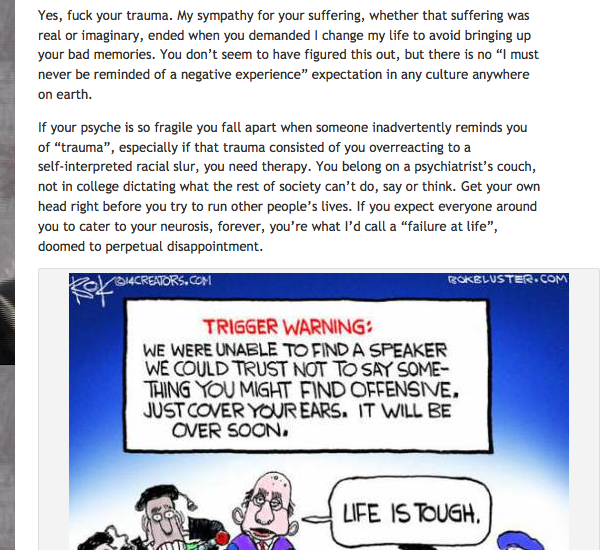Conversing with this post: http://chrishernandezauthor.com/2015/01/02/microaggressions-trigger-warnings-and-the-new-meaning-of-trauma/
What I Agree With:
What I Agree With:
1) When you said “fuck your trauma” and “fuck
my trauma”: I agree with your idea
that you can’t really expect to have people be that sympathetic and necessarily
care about your trauma because people all over the world have gone through
harder things. I respect that you said,
“fuck my trauma,” at least you’re willing to dismiss your own problems.
2) I can kind of agree with one point that you
seem to be making: that the micro-aggressions
don’t quite fall at that level of “trauma”, but I’m not sure that anyone
was really trying to recognize micro-aggressions as "trauma."
Only one of your examples, the petition by the UCLA student(s), actually
links microaggressions to trauma, and the purpose of that piece of writing
probably was more purposive rather than a declarative statement taken to
represent what they might actually think.
In other words, I think whoever wrote that petition used the word “traumatic” to draw attention
to their cause, which I agree
probably isn’t an appropriate use of the word.
What I Don’t Agree
With:
1) You give only the American soldier and yourself the
license to talk about trauma. It
appears the only people you give license to talk any kind of “trauma” is a
soldier who is handicapped as a result of combat. I’m not quite sure that’s quite right either
and somewhat myopic.
I have not listened to a lot of war stories, but I can
acknowledge that combat can be very traumatic on physical, emotional, and
social levels. So traumatic that I know
I would not want to entertain being an American soldier.
I’ve also listened to traumatic stories from the Cambodian
genocide in the 1970s. Labor camps,
harsh punishments, eating snakes to survive, starving, suffering from malnutrition
and poor health, being separated from family members, losing family members,
seeing bodies either beheaded, battered. people report roughly the same
experience. I mean if you want a scale
for trauma, I think that any story from that time and place would dwarf those
hardship experiences, but were not comparing are we?
I’d like to think I have a fair perspective of what trauma
is without having gone through any on the scale of either a soldier and/or a genocide
survivor.
I think deeply about the trauma of those events and always
think about how small and simple my problems are as a college-educated
Californian born into a middle-class family and try to remain grateful for all
the privileges I have.
2) I think you don’t fully understand what
micro-aggressions are nor why people like to point them out.
I don’t like being an elitist, ivory tower prick that tells
people that they don’t know what they are talking about.
But, what would happen if I, for these purposes, an everyday
civilian, tried to talk to you, a police officer, about police use-of-force
incidents, and what I think police should do and should have done in other
incidents?
Oh, I know that would go over well with you, and you’d be
just as receptive of my ideas right?
You’d probably be offended and tell me that I don’t
understand those worlds. Well same thing
here, you really don’t --- understand those academic worlds, so either try to
understand and use the language and terms, or just keep listening.
Pointing out microaggressions are usually not "traumatic" nor did the two examples you point out actually state that they were equating microaggressions to "traumas", but
I think pointing them out is a type of evidence-gathering.
Noting microaggressions is evidence-gathering of racist,
sexist, sizist, agist, ableist behaviors.
All behaviors that communicate to a minority group that they are somehow
lesser, inferior. Making note of them,
and showing them serves as concrete replies to the claims that tend to dismiss
what people experience, i.e. (we live in a color-blind, post-racial society).
I think some evidence is stronger than others, and you
cherry-picked some of the examples that don’t seem as strong.
3) You seem to assume that people nowadays are fragile and are falling apart just because they point out instances of discrimination when you say "Generations of Americans have experienced real trauma." "Don't move on with your life, just continue to be trapped by those obstacles that racism, sexism, sizism, agism, ableism, etc. etc.," said no one ever.
You seem to conflate the fact that people point these things out with people somehow being weak and being flummoxed by everyday life.
I guess it is so weak and a symbol of our pansy-ass times when civilians try to go to police and seek out evidence every time someone steals from, robs, cheats, attacks them.
Geeze, just move on people, if you're really strong you won't let such little things like that deter you. It isn't real "trauma" after all.
3) You seem to assume that people nowadays are fragile and are falling apart just because they point out instances of discrimination when you say "Generations of Americans have experienced real trauma." "Don't move on with your life, just continue to be trapped by those obstacles that racism, sexism, sizism, agism, ableism, etc. etc.," said no one ever.
You seem to conflate the fact that people point these things out with people somehow being weak and being flummoxed by everyday life.
I guess it is so weak and a symbol of our pansy-ass times when civilians try to go to police and seek out evidence every time someone steals from, robs, cheats, attacks them.
Geeze, just move on people, if you're really strong you won't let such little things like that deter you. It isn't real "trauma" after all.

No comments:
Post a Comment